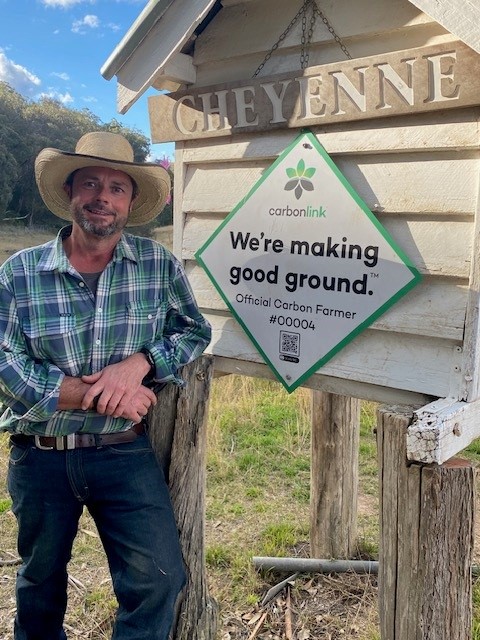Please see attached and below details of the award of 12,486 Australian Carbon Credit Units (ACCUs) by the national Clean Energy Regulator to the Cheyenne Soil Carbon Project near Walcha in the Northern Tablelands of NSW. The project area covered 578 hectares of the 760-hectare beef cattle property. It becomes the second soil carbon project in NSW to generate ACCUs.
Also attached are images of the property and its manager, Nick Blomfield.
If you would like to speak with Nick or a representative from CarbonLink, please contact me on 0412 205 151.
MEDIA RELEASE
Soil Carbon Credits Awarded to Pioneering Walcha Property
A multi-generational beef cattle farm near Walcha in the Northern Tablelands of NSW has achieved the significant milestone of hosting just the second soil carbon project in NSW to generate Australian Carbon Credit Units (ACCUs).
The Cheyenne Soil Carbon Project, which covers 578 hectares of the 760-hectare property, has been awarded 12,486 ACCUs by the national Clean Energy Regulator. Across the five-year reporting period to November 2021, changes in land management practices generated around 21.6 ACCUs per hectare, or 4.3 ACCUs per hectare per year.
Nick Blomfield, a longstanding regenerative agriculturalist, is the Manager of the Cheyenne Pastoral Partnership on the farm which has operated for over a century.
“My heart and soul has always been in regenerative agriculture, so this soil carbon project was really an extension of a lifetime of work. The single biggest change we made at Cheyenne was increasing stock density and grazing intensity in our paddocks. Combined with the application of organic material, we have seen a big increase in microbial stimulation and photosynthetic capacity. The result is a sustainable improvement to the structure and fertility of the soil.”
The Cheyenne Soil Carbon Project commenced in 2016. In partnership with leading soil carbon farming advisor CarbonLink, the key land management changes included:
- Increasing paddock numbers from 88 to 104 between 2016 and 2021. They have since been increased to more than 140 paddocks.
- Incrementally reducing the average paddock size from 8.6 hectares to 5.5 hectares.
- Replacing superphosphate with chicken manure to improve the water-holding capacity and aeration of soil, promoting healthy root growth.
Cheyenne now carries an average of 500 head of cattle, a doubling of capacity over the past 30 years. Nick Blomfield attributes this growth to improvements in soil quality, and he wants more farmers to follow his lead.
“While our farm may be small on a national scale, this result demonstrates the immense potential of small farms to drive change. If we collectively commit to sustainability through carbon farming practices, together we can have a significant positive impact on the environment,” Nick said.
The Cheyenne Soil Carbon Project was registered under the 2014 Soil Carbon Method. It was subsequently varied to comply with the 2018 and 2021 Methods to facilitate the calculation of the ACCUs. A comprehensive review of the project was undertaken by an independent, qualified audit company to ensure compliance with the legislation.
Role of CarbonLink
CarbonLink works with Australian farmers to help them navigate the complexities of carbon farming, offering clear strategies supporting economic growth and environmental care.
Dr Terry McCosker OAM, CarbonLink Chairman, echoed Nick Blomfield’s call for more farmers to consider a carbon farming strategy.
“The Cheyenne project is proof that size doesn't limit your ability to make a difference. By adopting carbon farming strategies, Australian primary producers on farms of all sizes can be at the forefront of a sustainable future,” Dr McCosker said
“As a grazier, embracing carbon farming can directly enhance your land’s productivity and sustainability. This approach enriches soil fertility, boosts water retention, and strengthens your farm against climate variability, laying the groundwork for long-term profitability.
“Furthermore, carbon farming offers the opportunity to generate additional income through the ACCU scheme, at the same time as contributing to a healthier planet.”
Dr McCosker said CarbonLink is currently working with prospective soil carbon producers, investigating the feasibility of projects in all States.
In addition, it is engaging in various national scale projects to investigate how soil carbon sampling costs can be reduced further.
Key Facts:
The Cheyenne Soil Carbon Project near Walcha in the Northern Tablelands has been awarded 12,486 Australian Carbon Credit Units (ACCUs).
It is just the second property in NSW to generate ACCUs for a soil carbon project.
The project area covers 578 hectares of the 760-hectare, multi-generational beef cattle farm, operated by Nick Blomfield.
Contact details:
Todd Hayward, Mob: 0412 205 151

